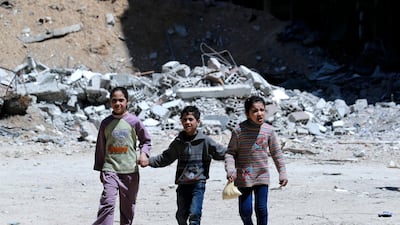International aid organisations are set to meet in Brussels on Tuesday for a two-day donor conference to discuss Syria’s war-torn future.
Brussels has invited approximately 85 governments and non-governmental agencies aiming to raise $6 billion in funds for humanitarian aid, reconstruction and de-mining of shattered cities as the devastating conflict enters its eight-year.
"The meeting is going to be about how the international community is committing to putting an end to the crisis and to meet the dire needs of people suffering," Oxfam's Policy Advisor, Julien Vaissier, told The National.
Some of the biggest aid donors include the United States, European Union, Norway and Japan.
The conference will be the third annual meeting after London 2016 and Brussels last year which will take the opportunity to bring change for millions of vulnerable Syrians.
Ahead of the conference, the United Nations International Children’s Fund (UNICEF) is calling for the international arena to focus on developing children’s education.
Geert Cappelaere, UNICEF's Regional Director for Middle East and North Africa told The National that the organisation calls for an end to the war as destruction and death continue to tear apart every aspect of children's lives.
“Children have suffered way too much already and therefore those responsible for the flight and have influence over the fighting must exercise their authority to end this war - to end it today,” Mr Cappelaere said.
The seven-year long conflict has caused 2.8 million children to miss out on their education, he said.
“We need to continue to increase our efforts to keep the children who are going to schools in school but also to get those that are out of school to benefit from education,” Mr Cappelaere said.
UNICEF’s particular concern are the adolescence children who are not attending schools. The organisation is calling on the international community to ensure that children can concentrate on their education and are not forced to work.
“Out of the 2.8 million that are currently out of school, 40 per cent are at the age of 15-17 years old,” Mr Cappelaere said.
Save the Children is calling on the international community to take the necessary steps to ensure that donor pledges are made for investments in a safe, quality and affordable education.
"What we are asking of the international community is to honour the pledges they made in London, to spend up to 1.4 billion dollars a year - that's the estimate of what it take to educate every Syrian child - that's what we are calling for them to honour in Brussels," Jacqueline Hale, head of advocacy in Save the Children's Brussels office told The National.
“What we’d like to do is tackle the issue of insuring that children who are able to go to school have a quality learning experience,” she said, adding that there is no point of children sitting in a classroom if they are unable to learn.
The European Union’s top diplomat, Federica Mogherini is appealing to Russia, Iran and Turkey - who are the key powers with direct military involvement in the war - to support a lasting ceasefire to allow aid access and medical evacuations.
Governments are expected to send senior ministers such as Turkey’ deputy Prime Minister Recep Akdag confirmed and possibly Iran’s Foreign Minister Mohammed Javad Zarif, EU officials said.
Russia’s Foreign Minister, Sergei Lavrov, has been invited but it is still unclear if he will attend.


